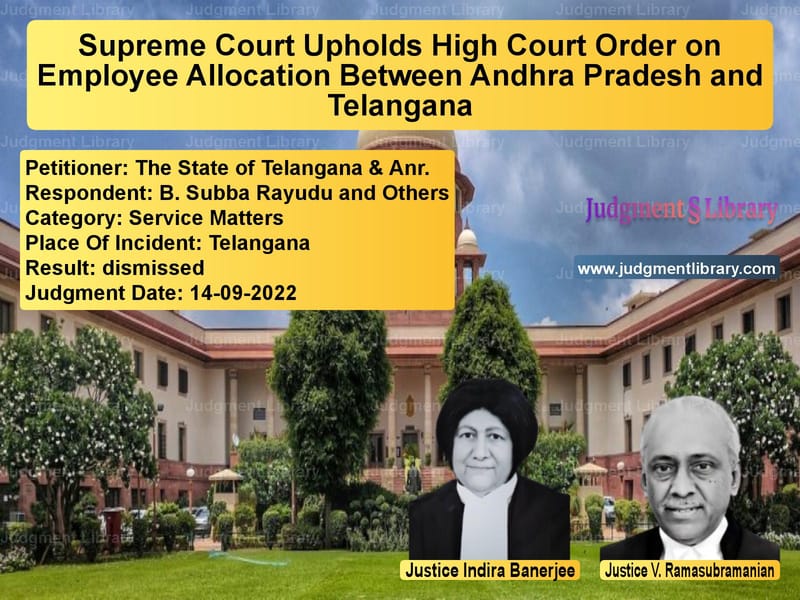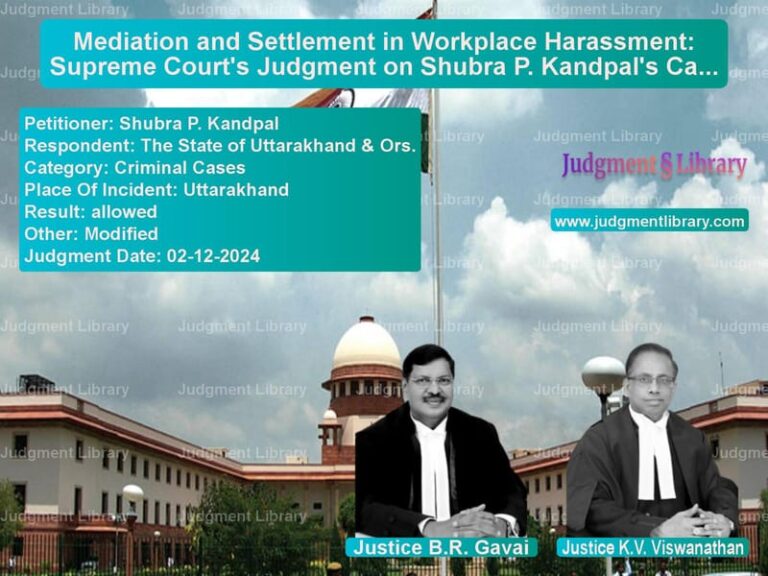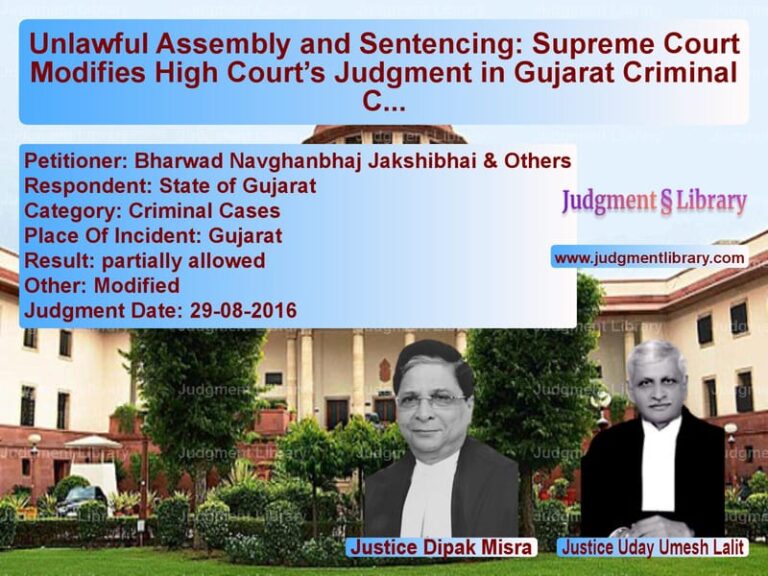Supreme Court Upholds High Court Order on Employee Allocation Between Andhra Pradesh and Telangana
The Supreme Court of India, in a crucial ruling, upheld the decision of the High Court directing the allocation of Respondent No.1, B. Subba Rayudu, to the State of Telangana. The case involved the allocation of State Cadre employees following the bifurcation of Andhra Pradesh into two states—Andhra Pradesh and Telangana—under the Andhra Pradesh Reorganisation Act, 2014.
Background of the Case
The case revolved around the bifurcation of Andhra Pradesh and the subsequent allocation of employees to the two newly formed states. The respondent, a Joint Director-Class A in the Animal Husbandry Department, was initially working in Telangana but was later allocated to Andhra Pradesh by the Central Government.
The respondent challenged this allocation, contending that he was a local candidate of Telangana, had exercised his option for Telangana, and that his spouse was also employed in Telangana. The High Court ruled in favor of the respondent and set aside the Central Government’s allocation order. The State of Telangana and the Union of India challenged this ruling before the Supreme Court.
Arguments Presented
Arguments by the Petitioner
Mr. Aman Lekhi, learned Additional Solicitor General, appearing for the petitioners, argued that:
- The allocation was carried out per the guidelines established under the Andhra Pradesh Reorganisation Act, 2014.
- Section 77(2) of the Act required the Central Government to allocate employees based on options received and other considerations.
- As per the guidelines, local candidates of a state were given priority in allocation.
- The respondent was considered a local candidate of Andhra Pradesh based on his place of birth and other factors.
- There were no vacancies in Telangana for accommodating the respondent.
Arguments by the Respondent
Ms. Mohana, appearing on behalf of the respondent, countered that:
- The High Court’s judgment was well-reasoned and did not warrant interference.
- The respondent had studied in Telangana, making him a local candidate of the state.
- He had worked in Telangana and had exercised his option to continue there.
- His spouse was also posted in Telangana, and under Clause 18(l) of the guidelines, spouses should be allocated to the same state where possible.
- The allocation guidelines required considering seniority, and the respondent was the most senior among those who had opted for Telangana.
Supreme Court’s Observations
The Supreme Court, after reviewing the case, made the following observations:
- The Andhra Pradesh Reorganisation Act, 2014, provided a framework for allocating employees.
- Under Clause 18(f) of the guidelines, allocation was to be based on seniority, and the respondent was the most senior among those opting for Telangana.
- The High Court correctly found that ignoring the respondent’s seniority was an error.
- The respondent met the criteria of a local candidate for Telangana based on his education and residence history.
- The respondent’s spouse was a local candidate of Telangana, strengthening his claim for allocation to the same state.
The Court categorically held: “There is no infirmity in the well-reasoned order of the High Court which calls for interference. The High Court correctly interpreted the allocation guidelines in light of constitutional principles.”
Final Verdict
The Supreme Court dismissed the Special Leave Petitions filed by the State of Telangana and the Union of India. The Court upheld the High Court’s ruling, thereby affirming the respondent’s allocation to Telangana and directing the state to give him an appropriate posting and salary.
Conclusion
This judgment reinforces the principle that statutory guidelines must be interpreted in a manner that ensures fairness and justice. The ruling underscores that considerations such as seniority, local candidacy, and spousal employment should not be overlooked while allocating employees to states after bifurcation. It also serves as a precedent for ensuring that reorganization processes do not infringe upon constitutional rights.
Petitioner Name: The State of Telangana & Anr..Respondent Name: B. Subba Rayudu and Others.Judgment By: Justice Indira Banerjee, Justice V. Ramasubramanian.Place Of Incident: Telangana.Judgment Date: 14-09-2022.
Don’t miss out on the full details! Download the complete judgment in PDF format below and gain valuable insights instantly!
Download Judgment: the-state-of-telanga-vs-b.-subba-rayudu-and-supreme-court-of-india-judgment-dated-14-09-2022.pdf
Directly Download Judgment: Directly download this Judgment
See all petitions in Transfers Cases
See all petitions in Recruitment Policies
See all petitions in Public Sector Employees
See all petitions in Judgment by Indira Banerjee
See all petitions in Judgment by V. Ramasubramanian
See all petitions in dismissed
See all petitions in supreme court of India judgments September 2022
See all petitions in 2022 judgments
See all posts in Service Matters Category
See all allowed petitions in Service Matters Category
See all Dismissed petitions in Service Matters Category
See all partially allowed petitions in Service Matters Category







